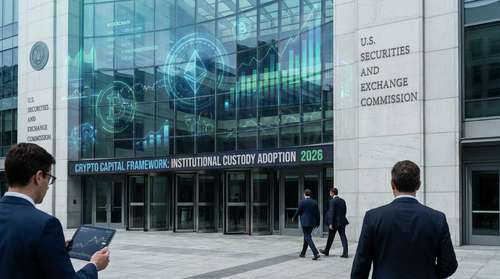As the dust settles after the 2024 U.S. election, all eyes are on how President-elect Donald Trump’s administration could reshape the cryptocurrency industry.
The new administration brings a clear intent to create a crypto-friendly landscape. This implies that Trump's leadership could profoundly influence regulations, Bitcoin policies, and blockchain innovation. Let’s explore what these shifts could mean for the U.S. crypto market and the broader global industry.
Trump’s Evolving Stance on Crypto: What It Means for the Industry
President Trump’s relationship with cryptocurrency has shifted from initial skepticism to cautious engagement. While he initially dismissed Bitcoin as a “scam” and voiced doubts about its security, he later launched his own series of NFTs, signaling an openness to digital assets that could influence future policies.
In recent statements, Trump has indicated support for domestic Bitcoin mining, possibly seeing it as a way to bring jobs and investment back to the U.S. This approach contrasts sharply with current regulations, especially under the SEC’s oversight, which has been criticized for its rigorous approach to digital assets. Trump’s administration might ease such regulations and support the expansion of crypto-friendly states, where mining operations have already seen substantial growth.
Potential U.S. Crypto Regulations Under Trump
Under Trump, U.S. crypto regulations might be re-evaluated, starting with a move to dismantle some of the restrictive measures previously introduced. Here are some of the potential regulations that could get headway.
Tax Relief for Investors
Trump’s previous administration enacted sweeping tax reforms, and he has hinted at further reductions, which could extend to capital gains taxes on crypto. Currently, the IRS treats crypto assets as property, meaning every transaction is subject to capital gains tax, a burden for frequent traders.
Lowering these taxes could attract more investment into digital currencies. Trump’s tax policies could also introduce incentives for companies dealing in crypto or blockchain, making it easier for firms to invest in crypto without facing heavy taxation penalties.
Clarifying the Role of the SEC
Under Biden, the SEC, led by Gary Gensler, took a hardline stance, filing cases against exchanges like Coinbase and Binance. With Trump’s administration, there’s potential for more regulatory distinction between commodities (like Bitcoin) and securities, especially if more control is given to the Commodity Futures Trading Commission (CFTC).
Also, a change in the Securities and Exchange Commission's (SEC) leadership could be on the horizon. Trump’s past conflicts with SEC policies indicate that a pro-crypto chair might be appointed, potentially reversing some of the agency’s restrictive enforcement actions.
New Bitcoin and Blockchain Investments
Trump has expressed interest in making the U.S. a leader in Bitcoin mining. During his campaign, he proposed measures to encourage Bitcoin mining domestically to counterbalance China’s dominance in the sector.
Trump's administration could introduce a federal Bitcoin reserve, similar to national gold reserves, to boost U.S. holdings and secure Bitcoin as an asset. Earlier this year, Lummis introduced legislation suggesting the U.S. acquire up to one million Bitcoin as a strategic asset—a bold move that Trump’s administration might support. And just after the election, she revealed her plans to push forward a bill to “build a strategic Bitcoin reserve.”
This reserve, primarily intended to address the national debt, aligns with Trump’s broader plan to strengthen the U.S. dollar through digital assets.
Stablecoin Developments
Trump’s administration could favor stablecoins over a central bank digital currency (CBDC), seeing stablecoins as more aligned with free-market principles. This would allow the U.S. to leverage blockchain technology for efficient transactions without fully centralizing digital currency, appealing to traditional crypto advocates.
Key Legislative Pieces to Watch
Trump’s policies may depend on support from Congress, where three significant crypto bills are already generating momentum:
- FIT for the 21st Century Act (FIT21): This bill, already passed in the House, aims to give the CFTC authority over specific crypto assets while limiting the SEC’s involvement. FIT21 aligns well with Trump’s expected regulatory stance. Support for Financial Innovation and Technology (FIT21) across party lines suggests it could move forward more readily under Trump.
- The Responsible Financial Innovation Act: Drafted by Senators Cynthia Lummis and Kirsten Gillibrand, this bipartisan bill proposes a comprehensive crypto framework. Trump may endorse the Responsible Financial Innovation Act, which could see expanded bipartisan support to offer clearer guidelines on taxation and regulatory clarity for crypto assets.
- Digital Asset Anti-Money Laundering Act: Sponsored by Senators Lindsey Graham and Elizabeth Warren, this legislation targets crypto-based financial crimes. With Trump backing crypto, he may modify this bill to balance enforcement with innovation, likely supporting regulatory frameworks that combat illegal activity.
Trump Election Crypto Policies: Potential Risks
While Trump’s approach appears promising for the crypto industry, challenges remain. Crypto regulation is complex, requiring a balance between promoting innovation and ensuring market stability. Here are some potential risks to also watch out for:
- Risk of Regulatory Gaps: Reducing regulatory oversight might expose the crypto market to instability. While pro-crypto policies could foster growth, an unregulated environment may encourage risky financial products, heightening market vulnerability.
- Increased Market Volatility: With more Americans investing in crypto under favorable policies, the market could experience higher volatility, especially if tax incentives prompt a significant influx of retail investors. Market shocks could be amplified, potentially deterring institutional investors.
- Conflicts with International Regulations: Trump’s policy direction could put the U.S. at odds with international regulatory bodies advocating stricter crypto controls. Divergent policies may create operational challenges for U.S.-based crypto firms operating globally.
- Potential Centralization Risks in DeFi: Trump’s support for DeFi could attract centralized players aiming to influence the decentralized space, potentially diluting DeFi’s core ethos. If large institutions dominate DeFi, smaller players might face barriers in a market intended to promote financial inclusivity.
Final Thoughts: A Crypto-Friendly Leadership?
Trump’s administration presents opportunities for the U.S. crypto industry. With his evolving stance and newfound interest in digital assets, Trump may champion policies that attract investment in U.S.-based crypto companies and support blockchain innovation. His administration could incentivize Bitcoin mining, lower taxes on digital asset gains, and work to create a less restrictive regulatory framework.
However, much will depend on collaboration between the executive branch and Congress. Investors should watch closely as Trump’s administration navigates its relationship with crypto and blockchain technology. But here is the fact; that Trump’s election is setting the stage for a potentially transformative period in the U.S. crypto landscape.




